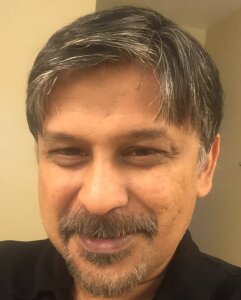Biography
Anustup Basu is a Professor in English, Media and Cinema Studies, and Criticism at the University of Illinois at Urbana-Champaign. He is the author of Hindutva as Political Monotheism (Duke University Press, 2020), Bollywood in the Age of New Media: The Geotelevisual Aesthetic (Edinburgh, 2010) and the co-editor of the volumes InterMedia in South Asia: The Fourth Screen (Routledge, 2012) and Figurations in Indian Film (Palgrave-Macmillan, 2013). His essays on film, media, culture, philosophy, and politics have appeared in journals like boundary 2, Semiotic Inquiry, Journal of Human Rights, Postscript, South Asian History and Culture, PostModern Culture, and Critical Quarterly. As a film producer, he made the Bengali feature Herbert (2005) which won the Indian National Award for the Best Regional Film. He has worked as a screenwriter for film and television, having recently co-written the upcoming Hindi feature film Nazarbandh (2019) which is official entry at the 2020 Busan Film Festival.
Research Interests
Primary:
- Indian Cinema, Philosophy of the New Media, Film Theory, Third Cinema (especially Hong Kong, China, the African continent, Iran, and India), Globalization theories, Post-colonial studies, Marxism, and Post-structuralism.
Secondary:
- Theories of the Novel, Modern Bengali fiction and poetry, Indian artistic and literary modernisms of the 19th century, Classical Indian Philosophy, Composition and Rhetoric, Argumentative Writing.
Research Description
Currently I am finishing up two books:
Nehruvian Cinema: Bombay and Bengal (1955-1962): a wide ranging theoretical study on the themes of Nationhood, Modernity, and Counter-Memory in Hindi and Bengali films made between 1955 and 1962. And Hindutva and Advertised Modernization: a genealogical study of the invention of Hinduism as a ‘Monotheism’ in the modern era. This Semitic ordering of a million different forms of piety was deemed essential for the emergence of a national sense of Hindu peopleness and demographic identity. The book looks at an earlier literary moment of this project and then an advertised/mediatized form of metropolitan Hinduness that has come to the fore in recent times.
Essays forthcoming or in development:
“The Pathos of Decisionist Desire: Contemporary India and the Specter of Narendra Modi.” Solicited for boundary 2.
“Filmfare, Cosmopolitanism, and Bombay Cinema of the Fifties” solicited for an anthology tentatively entitled Industrial Networks of Indian Cinema
I am also working towards a political philosophy of our digital information environment and its relations with war, consensus, and liberalism
Additional Campus Affiliations
Professor, English
Professor, Media and Cinema Studies
Professor, Unit for Criticism and Interpretive Theory
Highlighted Publications
Basu, A. (2020). Hindutva as Political Monotheism. Duke University Press. https://doi.org/10.1215/9781478012498
Basu, A. (2010). Bollywood in the Age of New Media: The Geo-televisual Aesthetic. Edinburgh University Press. http://www.jstor.org/stable/10.3366/j.ctt1r2brj
Recent Publications
Basu, A. (2023). Islam and the Orientalist Vision in Padmaavat. Journal of Muslim Philanthropy and Civil Society, 7(2), 118-137.
Basu, A. (2023). Orientalism’s Hinduism, Orientalism’s Islam, and the Twilight of the Subcontinental Imagination. Religions, 14(8), Article 1034. https://doi.org/10.3390/rel14081034
Basu, A. (2023). Re-Texturing the Past: The Digital Image and the Contemporary Bollywood Historical. In S. Gopinath, & R. Deshmukh (Eds.), Historicizing Myths in Contemporary India: Cinematic Representations and Nationalist Agendas in Hindi Cinema (pp. 64-80). Routledge India. https://doi.org/10.4324/9781003363149-4
Basu, A. (2021). Hindutva 2.0 as information ecology. In I. Keul (Ed.), Spaces of Religion in Urban South Asia (Routledge South Asian Religion Series). Routledge. https://doi.org/10.4324/9781003106067-13
Basu, A. (2021). The Popular. BioScope: South Asian Screen Studies, 12(1-2), 144-147. https://doi.org/10.1177/09749276211026158
